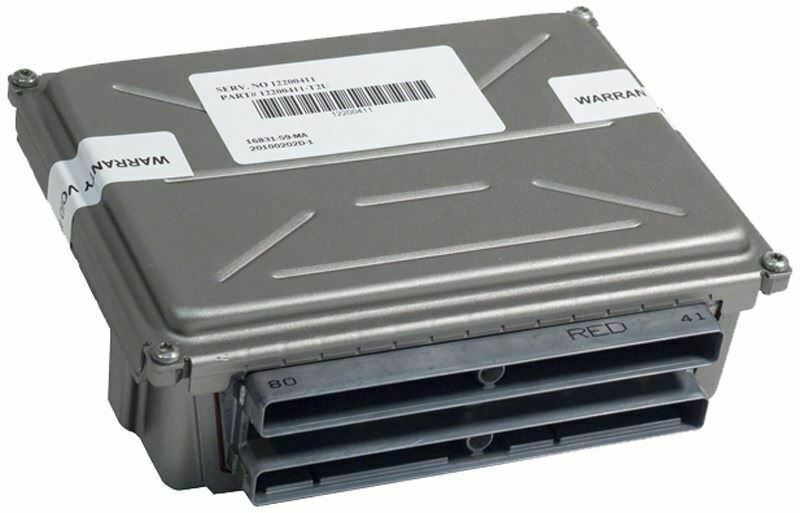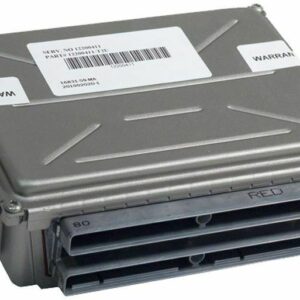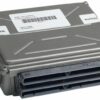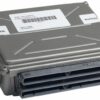Restore Peak Performance to Your GM Truck or SUV
Is your Chevrolet SSR, Silverado, Tahoe, or other GM vehicle suffering from perplexing issues like random stalling, erratic shifting, a persistent check engine light, or poor fuel economy? These are classic signs of a failing Powertrain Control Module (PCM), the central computer of your vehicle. Don’t let a faulty module keep you off the road. This replacement PCM, part number 89017734, is the reliable, straightforward solution you need to restore your vehicle’s drivability and efficiency.
As a technician with over two decades of experience, I’ve seen firsthand how a failing PCM can mimic a dozen other problems, leading to expensive and unnecessary parts replacement. The PCM manages everything from fuel injection and spark timing to transmission shift points. When its internal circuits or software degrade, the symptoms can be frustratingly inconsistent. This module is your direct path to a lasting fix.
The Smart Solution: Programmed & Ready for Installation
The biggest hurdle in replacing a modern vehicle’s computer is the programming. Typically, this requires a trip to the dealership and hundreds of dollars in labor. We eliminate that step entirely. When you purchase this 2003 SSR PCM, we flash it with the latest official GM software updates using the Vehicle Identification Number (VIN) you provide. It arrives at your door ready to be installed, saving you significant time, money, and hassle. This isn’t just a replacement; it’s a way to ensure your vehicle’s software is fully up-to-date, addressing potential factory bugs and improving overall operation.
A Technician’s Notebook: The Intermittent No-Start Nightmare
I remember a 2005 Silverado 2500 that came into the shop on a tow truck. The owner was at his wit’s end. The truck would start and run fine for weeks, then suddenly refuse to start. He’d already replaced the battery, starter, and fuel pump with no luck. After connecting my scan tool, I noticed intermittent communication loss with the PCM (a U0100 code). On a hunch, I let the engine warm up and then used a heat gun on the PCM. Sure enough, as the module got hot, the engine would stall and refuse to restart. Once it cooled down, it fired right up. The internal processors were failing under heat soak—a common issue. We installed a pre-programmed PCM just like this one, and the truck has run flawlessly ever since. This simple swap solved a problem that had stumped two other shops.
Is Your Truck Showing These Symptoms?
- ✔ Persistent Check Engine Light (CEL)
- ✔ Stalling for no apparent reason
- ✔ Rough or inconsistent idling
- ✔ Harsh or erratic automatic transmission shifting
- ✔ A noticeable drop in fuel mileage
- ✔ Engine cranks but refuses to start
- ✔ Error codes related to module communication or internal memory, such as P0601, P0606, or U0100.
Your Straightforward Installation Guide
Installing your new 2003 SSR PCM is a manageable task for a confident DIYer. While specific steps may vary slightly by model, here is a general guide.
- Safety First: Always disconnect the negative terminal from your vehicle’s battery and wait 10-15 minutes for any residual power to dissipate.
- Locate the Old PCM: On most GM trucks and SUVs from this era, the PCM is located in the engine bay, either on the driver’s side fender well (often under or near the battery) or next to the air filter box.
- Disconnect the Harnesses: The PCM has several large multi-pin electrical connectors. Carefully release the locking tabs or levers and pull the connectors straight out. Never force them. Inspect the connectors for any corrosion or bent pins.
- Remove the Module: Unbolt the old PCM from its mounting bracket. It’s typically held in place by a few 10mm bolts.
- Install the New PCM: Mount your new, pre-programmed PCM onto the bracket and securely tighten the bolts.
- Reconnect Everything: Firmly plug the electrical harnesses back into the new module until they click into place. Reconnect your battery’s negative terminal.
- Perform CASE Relearn (If Necessary): After installation, your vehicle might require a Crankshaft Position System Variation (CASE) relearn procedure. This can often be done with a capable bi-directional scan tool. If not performed, you may have a P1336 trouble code, though the vehicle will typically still run. Many local repair shops can perform this service for a minimal fee if you don’t have the tool.
Verified Fitment For These GM Vehicles
This module is a direct replacement for units with service numbers 89017750, 12582605, 12589463, 12602802, 89017734, or 28042802. Please verify your part number or use the compatibility list below. This part fits a wide range of vehicles, including:
- Chevrolet SSR: 2003
- Chevrolet Avalanche 1500/2500: 2003-2006
- Chevrolet Silverado 1500/2500/3500: 2003-2007 (Classic Style)
- Chevrolet Suburban 1500/2500: 2003-2006
- Chevrolet Tahoe: 2003-2006
- GMC Sierra 1500/2500/3500 & Denali: 2003-2007 (Classic Style)
- GMC Yukon & Yukon XL 1500/2500: 2003-2006
- Cadillac Escalade, ESV, EXT: 2003-2006
- Hummer H2: 2003-2007
- GMC Envoy XL: 2003 (5.3L)
- Isuzu Ascender: 2003 (5.3L)
- Chevrolet Trailblazer EXT: 2003 (5.3L)
Note: Please check the detailed fitment list in the product details to confirm specific options and engine sizes for your year and model.
Frequently Asked Questions
Do I need to have this module programmed by a dealer?
No. We handle the programming for you before shipment. Simply provide your vehicle’s VIN during checkout, and the module will arrive ready to install with the latest GM software.
What is a VIN and where do I find it?
The VIN (Vehicle Identification Number) is a unique 17-digit code for your vehicle. You can find it on your driver’s side dashboard (visible through the windshield), on the driver’s side door jamb sticker, or on your vehicle’s registration and insurance documents.
Is this a direct replacement for my part number?
Yes, this module is a direct replacement for several service numbers, including 89017734, 12602802, 12589463, and others listed. As long as your original module carries one of these numbers, this part will be a perfect fit.
What is a CASE Relearn and is it always required?
A CASE (Crankshaft Position System Variation) relearn synchronizes the new PCM with your engine’s crankshaft position sensor. It is not always required, but if you get a Check Engine Light with code P1336 after installation, this procedure is needed. Most professional scan tools can perform it in minutes.
What if I have questions during installation?
Our team of experienced automotive professionals is here to help. We provide support to ensure you can get your vehicle back on the road. Your success is our priority.



